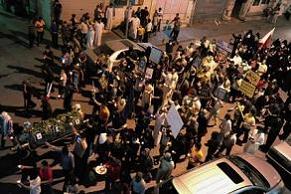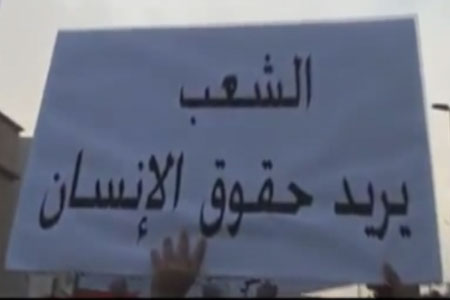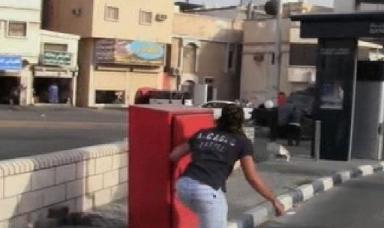Saudi Arabia´s Interior Ministry has defended the regime’s ruthless repression of anti-government protests on Monday and threatened to use an “iron fist” against protesters.
Yusuf Fernandez
 Saudi Arabia´s Interior Ministry has defended the regime’s ruthless repression of anti-government protests on Monday and threatened to use an “iron fist” against protesters.
Saudi Arabia´s Interior Ministry has defended the regime’s ruthless repression of anti-government protests on Monday and threatened to use an “iron fist” against protesters.
“It is the state's right to confront those that confront it first... and the Saudi Arabian security forces will confront such situations ... with determination and force and with an iron first,” the ministry said in a statement on Monday.
An interior ministry spokesman said the statement was released in reaction to a sermon delivered last Friday in the Eastern town of Qatif which criticized the Saudi government´s handling of the protests.
In a statement released Monday, a security source at the ministry said the sermon of the “Sheikh”, who was not named, was highly politicized and contained “controversial arguments and odd logic”.
According to the ministry, the Sheikh was ignoring the fact that the protests were “nothing but terrorism which gives the state every right to deal with it”.

Democratic Demands
Protesters in Saudi Arabia are not demanding particularly radical changes: a constitutional monarchy, an end of the absolute power of the royal family, an end to corruption, the right to elect at least some of their rulers, freedom for women, and the release of the thousands of political prisoners. Other protesters also want political pluralism.
Currently, political parties, trade unions, pro-immigrant organizations or women´s groups are banned in the country. Opposition activists are regularly branded as “Al Qaida militants” or “foreign agents”.
Demonstrators are also demanding changes in the judicial system, which is characterized by double standards and hypocrisy. A newspaper recently reported that an immigrant was sentenced to 14 months in prison and 80 lashes for stealing a piece of food from a restaurant. Meanwhile, a committee in Jeddah that has spent more than a year investigating the disappearance of millions of public funds assigned to the municipality to build a sewerage system is yet to make any formal accusations of responsibility. Offences which involve the rich people or members of the royal family go mostly unpunished.
The emergence of a new internet-savvy generation, the example set by the Arab revolutions and the worsening economic situation, all fuel the emergent discontent. The oficial rate of unemployment amongst the male population is 10%, though many estimate it to be much higher. The unemployment rate for women has not been officially announced but a report in 2010 estimated it at more than 26%.
Since February 2011 Saudi protesters have held demonstrations on an almost regular basis in the oil-rich Eastern Province, mainly in Qatif and the town of Awamiyah, calling for the release of all political prisoners, freedom of expression and assembly, and an end to widespread economic and religious discrimination in the Shia-majority region.
Use of Internet
In order to spread their message rapidly, Saudi dissidents are using the Internet extensively. In Riyadh, protests were sparked by a young Sunni man, Mohammed al-Wadani, who uploaded a YouTube video explaining why the monarchy had to fall. Fouad Alfarhan, a prominent Saudi activist, wrote for his part, that although he did not expect too many street protests, “the biggest gain is the awareness raised in a large faction of our young people of their human and political rights in this post-revolutionary world”.
According to McClatchy newspapers, judging from the number of times the protest videos are viewed and the comments posted by angry viewers, this media strategy is a success. For example, the video “Poverty in Saudi Arabia”, which was uploaded to YouTube has been viewed more than 1.5 million times. That would be equal to nearly one-tenth of Saudi Arabia's population of 18 million. The Interior Ministry detained its author, Feros Boqna, and two colleagues, Hussam al Drewesh and Khaled al Rasheed, for questioning.
The video showed images of the Jarradiah neighborhood, a slum situated less than five kilometers from the center of Riyadh. Amid widespread poverty and in order to raise money for the household, some local residents send their children to sell drugs and some women engage in prostitution.
Another You Tube hit is “Monopoly,” a black comedy satirizing the housing shortage. This video, authored by Bader Alhomoudi, portrays a generation of young professionals whose salaries do not allow them to buy even an apartment. In its first month , it was viewed 1.48 million times.
Some incipient political organizations, such as the recently-created Islamic Umma party whose founding members have been imprisoned, are also using Internet to announce their activities and look for new members.
Riyadh’s answer has been to intensify its crackdown on protesters and dissidents, especially since the beginning of 2012. Scores of anti-regime protesters in the kingdom’s eastern province of Safwa have been abducted or arrested. Some demonstrators have been killed.
Not surprisingly, the Saudi state has tried to involve all its bodies and institutions in this crackdown. The highest religious establishment, the Council of Senior Clerics, has deemed protests and petitions as “un-Islamic” and the Shura Council, the government-appointed advisory “parliament”, also supported the Interior Ministry's ban on demonstrations.
Ultimately the crackdown shows the Saudi regime fears going the same way as its old allies, Hosni Mubarak and Zeyn el Abidin Ben Ali. Saudi rulers know that their primary function, as far as their Westerner mentors and protectors are concerned, is to guarantee a cheap flow of oil. If, due to the protests in the kingdom, they failed in this mission, the West´s confidence in them would diminish accordingly. If this happens, the West would be forced to find alternative partners, possibly even Islamists.
Disclaimer:
Al-Manar is not responsible for the content of the comments. All opinions expressed are those of the posters. Al-Manar reserves the right to exclude comments that contain expressions falling beyond the bounds of decency.
